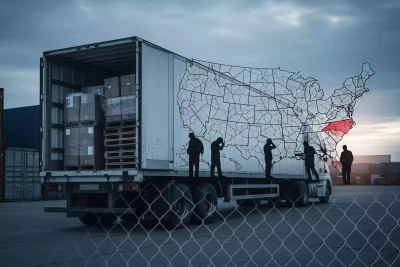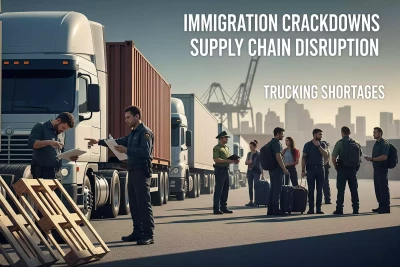Will Immigration Crackdowns Harm Trucking Capacity?
August 4, 2025
 The U.S. trucking industry is no stranger to workforce challenges. For years, fleets have struggled to recruit and retain qualified drivers, with labor shortages affecting supply chains across the country. Now, a new concern is emerging: Could stricter immigration enforcement further reduce trucking capacity?
The U.S. trucking industry is no stranger to workforce challenges. For years, fleets have struggled to recruit and retain qualified drivers, with labor shortages affecting supply chains across the country. Now, a new concern is emerging: Could stricter immigration enforcement further reduce trucking capacity?
Immigrants play a critical role in the trucking industry. According to the American Trucking Associations (ATA), more than 18% of U.S. truck drivers are immigrants, and in certain regions and sectors, that number is even higher. Many of these drivers fill vital roles in long-haul, regional, and last-mile delivery operations.
For an industry already operating with a persistent driver shortage, immigration crackdowns could have an outsized impact. Removing or discouraging immigrant labor may exacerbate workforce shortages, especially in segments of the industry that rely heavily on foreign-born drivers.
While many immigrant drivers are lawfully employed, enforcement actions—such as workplace audits or policy changes—can create uncertainty. Even legal immigrants and green card holders may face disruptions if enforcement efforts increase fear, delay renewals, or tighten visa requirements.
Additionally, some fleets rely on workers from programs like the H-2B visa for temporary, non-agricultural labor. Restrictions or cuts to these programs could also reduce the available pool of drivers and support staff.
If immigration enforcement reduces the number of available drivers, the consequences may ripple across the broader economy. Fewer drivers mean longer delivery times, higher freight costs, and reduced flexibility in supply chain operations. Industries that rely on just-in-time delivery models may be particularly vulnerable.
Moreover, smaller and midsize carriers—many of which already operate on thin margins—may find it harder to compete for limited driver talent. This could lead to increased market consolidation and reduced competition.
 Carriers can implement a number of strategies to prepare for potential disruptions. First, try to diversify recruitment strategies to include veterans, second-chance hiring, and underrepresented domestic groups. Invest in driver retention programs, including better pay, improved working conditions, and flexible scheduling. Finally, advocate for balanced immigration policies that support both national security and economic stability.
Carriers can implement a number of strategies to prepare for potential disruptions. First, try to diversify recruitment strategies to include veterans, second-chance hiring, and underrepresented domestic groups. Invest in driver retention programs, including better pay, improved working conditions, and flexible scheduling. Finally, advocate for balanced immigration policies that support both national security and economic stability.
The future of immigration policy remains uncertain, but its impact on the trucking industry is clear: Without a stable and sufficiently staffed workforce, transportation capacity could suffer. As policymakers consider changes, it’s essential to recognize the vital contributions immigrant drivers make to the nation’s logistics network.
Triple T Transport continues to monitor labor market trends and adapt its 3PL services to meet evolving demands. Our extensive network of carriers and deep industry insight allow us to deliver reliable, flexible freight solutions, even in times of labor uncertainty. Whether you’re facing capacity challenges or seeking to streamline your logistics, Triple T is here to keep your freight moving efficiently.














